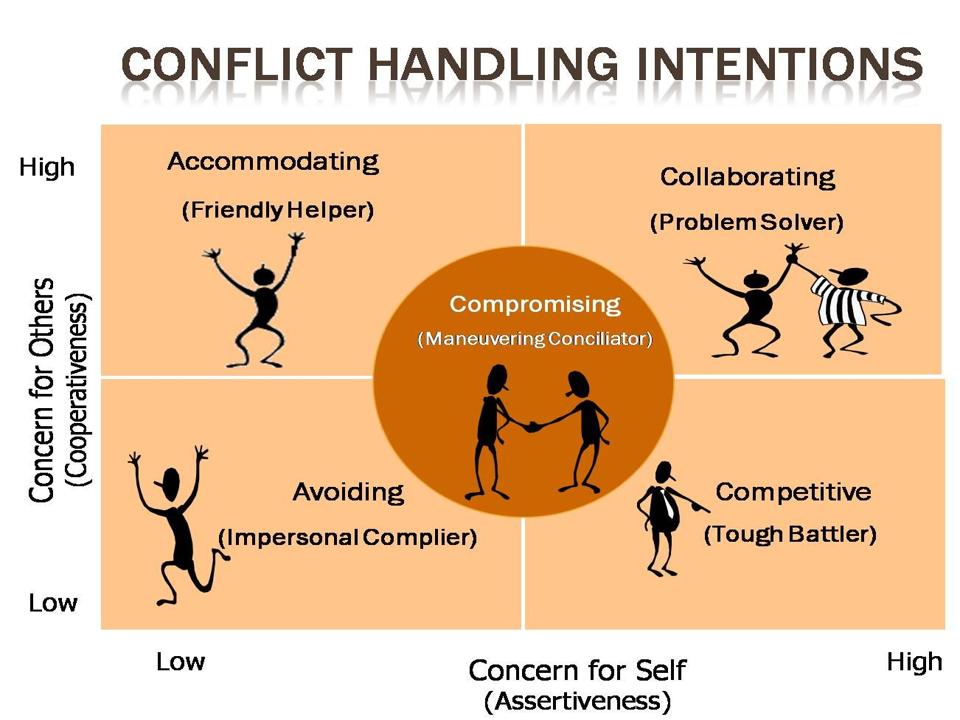Definition and Importance of Conflict Management and Resolution
Conflict management and resolution an introduction – Conflict management and resolution encompass the strategies and processes for identifying, understanding, and addressing conflicts in a constructive and effective manner. Effective conflict management and resolution are essential for maintaining healthy relationships, fostering collaboration, and promoting productivity within teams and organizations.
In the realm of conflict management and resolution, assertive managers play a pivotal role. Assertive managers possess a unique blend of communication skills, emotional intelligence, and problem-solving abilities that enable them to navigate conflicts effectively. Their ability to express their views clearly, respect the perspectives of others, and find mutually acceptable solutions makes them invaluable assets in any organization.
Conflicts arise from differences in perspectives, goals, values, and interests. Unmanaged conflicts can lead to misunderstandings, resentment, and even violence. By effectively managing and resolving conflicts, we can mitigate negative outcomes, preserve relationships, and create a positive and productive environment.
Conflict management and resolution play a crucial role in maintaining workplace harmony, especially in the face of diverse challenges. One significant challenge is managing an ageing workforce , which can bring unique conflicts related to generational differences, physical limitations, and retirement planning.
Understanding these challenges and implementing effective conflict management strategies can help organizations navigate these complexities and maintain a productive and cohesive work environment.
Types of Conflicts
Conflicts can be classified into various types based on their nature and scope:
- Interpersonal Conflicts:Occur between individuals, typically involving personal issues or disagreements.
- Intragroup Conflicts:Arise within a group or team, often due to differences in opinions, goals, or roles.
- Intergroup Conflicts:Occur between different groups or organizations, driven by competition, resource allocation, or ideological differences.
- Structural Conflicts:Stem from systemic issues within an organization or society, such as unequal power distribution or resource disparities.
- Latent Conflicts:Hidden or underlying conflicts that may not be immediately apparent but have the potential to escalate.
Causes of Conflicts, Conflict management and resolution an introduction
Conflicts can arise from various factors, including:
- Interpersonal Differences:Differences in personalities, values, communication styles, and goals can lead to conflicts.
- Organizational Factors:Poor communication, unclear roles and responsibilities, and competition for resources can contribute to conflicts.
- Societal Factors:Cultural differences, economic disparities, and political ideologies can create conflicts between groups.
- Environmental Factors:Scarcity of resources, pollution, and climate change can also be sources of conflict.
Final Thoughts: Conflict Management And Resolution An Introduction

Conflict management and resolution skills are essential for navigating the complexities of human interactions. By embracing empathy, active listening, and a collaborative mindset, we can transform conflicts into opportunities for growth, innovation, and strengthened relationships.
Conflict management and resolution are essential skills for any entrepreneur or manager. An entrepreneur who is also a manager must be able to effectively resolve conflicts within their team and with external stakeholders. Can an entrepreneur be a manager ?
The answer is yes, but it requires a different set of skills than being an entrepreneur alone. Conflict management and resolution are key skills for any manager, and entrepreneurs who want to be successful managers need to develop these skills.
Question Bank
What is the primary goal of conflict management?
The primary goal of conflict management is to effectively address and resolve conflicts while preserving relationships and fostering positive outcomes.
What are the key steps in the conflict resolution process?
The conflict resolution process typically involves identifying the conflict, understanding the perspectives of those involved, exploring potential solutions, and reaching a mutually acceptable agreement.
How can communication contribute to effective conflict resolution?
Effective communication is vital in conflict resolution as it allows parties to express their concerns, understand different viewpoints, and work towards a common understanding.
Conflict management and resolution involves identifying and addressing conflicts in a constructive manner. One of the key aspects of conflict management is channel incentive management, which is an activity performed under specific guidelines. By aligning incentives and fostering collaboration, channel incentive management helps prevent and resolve conflicts within distribution channels, thereby contributing to overall conflict management and resolution effectiveness.
Conflict management and resolution, as explored in the introduction, requires effective interpersonal skills and emotional intelligence. Project management, as discussed in this article , also necessitates similar abilities. Both disciplines emphasize communication, collaboration, and conflict resolution, highlighting the importance of these skills in various professional contexts.
Conflict management and resolution, an essential aspect of workplace dynamics, is intricately linked to the broader challenges faced by human resource management in an organization. Managing employee relations , fostering collaboration, and resolving disputes effectively are crucial for maintaining a harmonious and productive work environment.
By understanding the complexities of conflict management and resolution, HR professionals can better equip themselves to navigate the challenges of human resource management and create a workplace where employees thrive.
Conflict management and resolution is an essential skill for managers in any organization. When conflicts arise, it is important to be able to identify the root cause, develop strategies to address it, and facilitate a resolution that is fair and equitable for all parties involved.
Failure to do so can lead to a number of challenges, including decreased productivity, increased employee turnover, and a negative work environment. For more information on the challenges of management in an organization, please refer to this article. By understanding the principles of conflict management and resolution, managers can create a more positive and productive work environment for their employees.
Conflict management and resolution is a critical skill for any professional, and it can be especially useful in the financial industry. For example, if you’re wondering can you deduct investment management fees for an ira , the answer is yes, but only if you itemize your deductions.
Conflict management and resolution can help you navigate these types of complex financial situations and make the best decisions for your money.